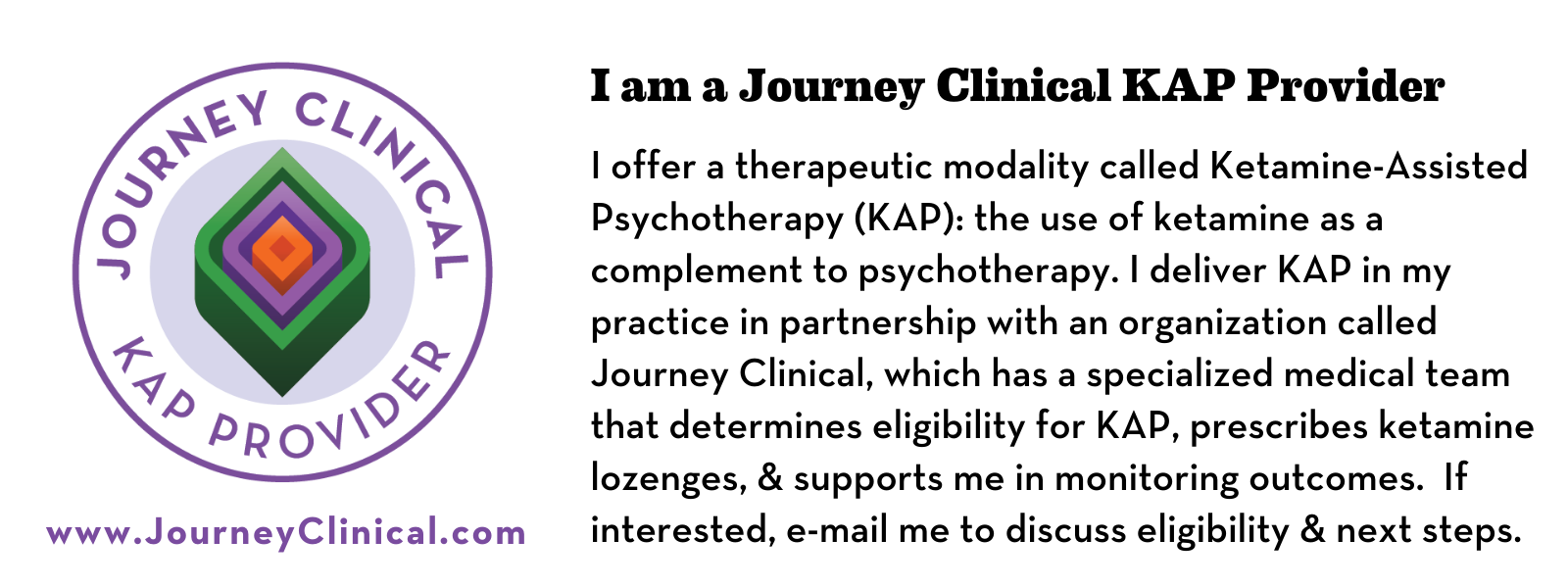Ketamine Assisted & Psychedelic Assisted Trauma and Depression Therapy (KAP)
Ketamine Assisted Psychotherapy offers a unique path to healing where the individual accesses deep emotional landscapes that are often inaccessible through traditional talk therapy.
Is talk therapy not working for you?
Is there a deep-seated issue or trauma that is affecting your quality of life, sense of well-being, or making it difficult to manage your thoughts and emotions?
Let’s walk a new path together!
Ketamine-Assisted Psychotherapy (KAP) and EMDR are powerful tools, particularly for individuals with treatment-resistant depression and PTSD. When Ketamine and EMDR are integrated, we are able to alter brain connectivity and reduce negative thought patterns, allowing access to deeper emotional healing from trauma and negative experiences, allows access to new perspectives, and facilitates breakthroughs that are difficult to achieve via traditional methods.
You’re in the right place!
What is Ketamine-Assisted Psychotherapy (KAP)?
-
If you have suffered with treatment resistant depression, or medication resistant depression, trauma, negative core beliefs, grief, phobias, or self-esteem issues, to name a few, then this therapy is for you.
If you are open to altered states of consciousness, willingness to engage in the therapeutic process, and desire a faster relief from depression and other debilitating emotional symptoms, then this is for you.
Ensure you seek medical advice prior to starting Ketamine if you have medical concerns.
-
If you currently have medical issue like high blood pressure, thyroid dysfunction or concerns, psychosis, a substance abuse background, please seek medical advice before pursuing Ketamine treatment.
NOTE: Prior to starting treatment, you will be seen with a medical doctor who will evaluate your history and concerns, and answer any questions you may have to deem appropriateness.
-
Ketamine assisted psychotherapy is available in supervised office settings, group setting and in supervised home settings.
Feel free to book a free consult for more information
-
Due to the enhanced neuroplasticity of the brain following a Ketamine session, clients are able to engage with difficult emotions and memories during the integration phase of therapy without fear or avoidant responses that occur when discussing trauma during talk therapy.
EMDR Is incorporated within 24-48 post Ketamine therapy with the purpose of targeting any remaining emotional distress or unresolved material, as well as with the purpose of re-processing specific trauma events that were identified prior to Ketamine treatment.
The most recent research on integrating Ketamine and Eye Movement Desensitization and Reprocessing (EMDR) therapy suggest that these two approaches may improve the treatment of trauma-related challenges, most specifically PTSD. EMDR is a long-established therapy for re-processing traumatic memories, using bilateral eye movements to help patients disconnect from triggers and ease or resolve emotional and somatic symptoms related to traumatic events. Ketamine, its dissociative effects, and promotion of neuroplasticity, may further enhance the tolerance to deal with the emotional response and provide more ease in using EMDR.
Early studies suggest that Ketamine's ability to lower individual’s emotional defenses, allow clients to engage in more effectively EMDR, which is especially true in cases where traditional EMDR has been difficult due to the severity of the trauma events or emotional blockage.
Research in this area was conducted by MAPS (Multidisciplinary Association for Psychedelic Studies), Johns Hopkins University, and other centers that are focused on psychedelic and trauma research, as well as in the preliminary reports of journals such as The Journal of Clinical Psychiatry and Frontiers in Psychology.
Ketamine-Assisted Psychotherapy and EMDR can…
Provide faster relief from treatment-resistant and medication-resistant depression and PTSD & you can effectively combine it with trauma therapies like EMDR
Allow you to access deeper healing from emotional distress and negative or traumatic memories
Provide a productive alternative to talk therapy, and integrate EMDR trauma focused therapy to access memories and emotions with less distress, in a shorter period of time
“Psychedelics when used responsibly and legally under proper supervision, can catalyze profound experiences of personal transformation.” -Dr Ronald Griffiths, Johns Hopkins University
FAQs about Ketamine-Assisted Psychotherapy (KAP) & KAP combined with EMDR
-
KAP is mental health treatment that combines the therapeutic effects of Ketamine at low, controlled and supervised doses, prescribed by a physician, that’s integrated with psychotherapy that helps lower depression, process traumatic or grief promoting events, and other conditions like anxiety, phobias and self-esteem challenges more effectively than psychotherapy alone.
-
Ketamine targets the brain’s glutamate system, improving the neuroplasticity and connectivity of the brain. It helped reduce symptoms, accesses suppressed emotions or memories and helps to break free from rigid patterns of thinking, allowing the creation of improved thought creation.
-
Ketamine routes of administration can range from nasal, intramuscular (IM), Intravenous (IV) or lozenges. After the administration, the therapist can assist the client with support through the journey in the form of mindfulness, talking, exploring emotions or memories, but it is all at the preference of the client, and as they tolerate or prefer integration of therapeutic processes.
A Ketamine journey can last between 2-3 hours depending on the route of administration, and the effects begin to wear off, allowing for integration of the experience with the therapist in the latter part of the session.

